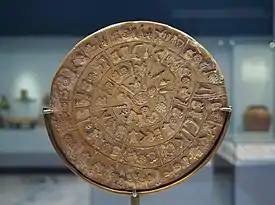Phaistos Disc (Unicode block)
Phaistos Disc is a Unicode block containing the characters found on the undeciphered Phaistos Disc artefact.

| Phaistos Disc | |
|---|---|
| Range | U+101D0..U+101FF (48 code points) |
| Plane | SMP |
| Scripts | Common (45 char.) Inherited (1 char.) |
| Assigned | 46 code points |
| Unused | 2 reserved code points |
| Unicode version history | |
| 5.1 (2008) | 46 (+46) |
| Unicode documentation | |
| Code chart ∣ Web page | |
| Note: [1][2] | |
Block
| Phaistos Disc[1][2] Official Unicode Consortium code chart (PDF) | ||||||||||||||||
| 0 | 1 | 2 | 3 | 4 | 5 | 6 | 7 | 8 | 9 | A | B | C | D | E | F | |
| U+101Dx | 𐇐 | 𐇑 | 𐇒 | 𐇓 | 𐇔 | 𐇕 | 𐇖 | 𐇗 | 𐇘 | 𐇙 | 𐇚 | 𐇛 | 𐇜 | 𐇝 | 𐇞 | 𐇟 |
| U+101Ex | 𐇠 | 𐇡 | 𐇢 | 𐇣 | 𐇤 | 𐇥 | 𐇦 | 𐇧 | 𐇨 | 𐇩 | 𐇪 | 𐇫 | 𐇬 | 𐇭 | 𐇮 | 𐇯 |
| U+101Fx | 𐇰 | 𐇱 | 𐇲 | 𐇳 | 𐇴 | 𐇵 | 𐇶 | 𐇷 | 𐇸 | 𐇹 | 𐇺 | 𐇻 | 𐇼 | 𐇽 | ||
| Notes | ||||||||||||||||
While the consensus of scholars is that the text on the disk should be read in right-to-left order (counterclockwise from the edge inwards, with the start of the text at the bottom), most published works about the disk in languages with left-to-right reading order show the text in left-to-right reading order too. Taking account of this fact, the Unicode directionality property of the characters was set to "left-to-right" (LTR), and the sign images in most Unicode fonts are left-to-right reversed compared to their appearance on the disk.[3][4]
Some signs occur in the disk in two or more orientations, rotated by 90 or 180 degrees. Therefore, the "normal" orientation of those signs is not known, and may be undefined; each Unicode font may make its own choice.[3][4]
History
The addition of Phaistos disk signs to Unicode was first proposed by John H. Jenkins in 1997,[5] but the addition was approved only after a new proposal by Michael Everson and John Jenkins in 2006. Their proposal followed included the 45 symbols defined by Arthur Evans in 1909 [6] (and used in practically all scholarly articles) as well as the sign modifier U+101FD PHAISTOS DISK SIGN COMBINING OBLIQUE STROKE (the short diagonal stroke added below some symbols) and the punctuation symbols U+101FE PHAISTOS DISK SIGN SEPARATOR (the radial line between "words") and U+101FF PHAISTOS DISK SIGN START OF TEXT (a radial line with five dots).[3] The sign names and the corresponding reference images were taken from a 1995 article by Louis Godart.[7]
The Unicode consortium adopted most of their proposal for inclusion in version 5.1 (2008), except the two alleged "punctuation" symbols U+101FE and U+101FF. These two code points are still unassigned as of Unicode version 15.0.
The following Unicode-related documents record the purpose and process of defining specific characters in the Phaistos Disc block:
| Version | Final code points[lower-alpha 1] | Count | L2 ID | WG2 ID | Document |
|---|---|---|---|---|---|
| 5.1 | U+101D0..101FD | 46 | L2/97-105 | N1575 | Jenkins, John H. (1997-05-21), Overview of the Aegean scripts |
| L2/97-106 | Jenkins, John H. (1997-05-22), Proposal to add Phaistos Disk script to ISO/IEC 10646 | ||||
| L2/97-288 | N1603 | Umamaheswaran, V. S. (1997-10-24), "8.24.1", Unconfirmed Meeting Minutes, WG 2 Meeting # 33, Heraklion, Crete, Greece, 20 June - 4 July 1997 | |||
| L2/06-095R | N3066R | Everson, Michael; Jenkins, John (2006-04-01), Proposal for encoding the Phaistos Disc characters | |||
| L2/06-108 | Moore, Lisa (2006-05-25), "C.8", UTC #107 Minutes | ||||
| N3103 (pdf, doc) | Umamaheswaran, V. S. (2006-08-25), "M48.13", Unconfirmed minutes of WG 2 meeting 48, Mountain View, CA, USA; 2006-04-24/27 | ||||
| L2/07-019 | McGowan, Rick (2007-01-16), Phaistos Disc Property Assignments | ||||
| L2/11-126 | Anderson, Deborah (2011-05-02), Phaistos Disc Glyph Errata | ||||
| L2/11-166 | Everson, Michael (2011-05-06), Response to L2/11-126 Phaistos Disc Errata | ||||
| |||||
References
- "Unicode character database". The Unicode Standard. Retrieved 2023-07-26.
- "Enumerated Versions of The Unicode Standard". The Unicode Standard. Retrieved 2023-07-26.
- Michael Everson and John Jenkins (1997): "Proposal for encoding the Phaistos Disc characters in the SMP of the UCS", ISO/IEC JTC1/SC2/WG2 Working Group Document N3066R (L2/06-095R), 2006-04-01.
- Michael Everson (2011): "Response to L2/11‐126 'Phaistos Disc Errata'" ISO Working Group Document L2/11-166, 2011-05-06.
- John Jenkins (1997): "Proposal to add Phaistos Disk script to ISO/IEC 10646". ANSI/NCITS Accredited Standards Committee publication L2/97-106, 1997-05-22.
- Arthur J. Evans (1909): Scripta Minoa, the written documents of Minoan Crete, with special reference to the archives of Knossos, Classic Books, ISBN 0-7426-4005-1
- Louis Godart (1995): The Phaistos Disc: the enigma of an Aegean script. translaed by Alexandra Doumas. Éditions Itanos. ISBN 960-7549-02-3